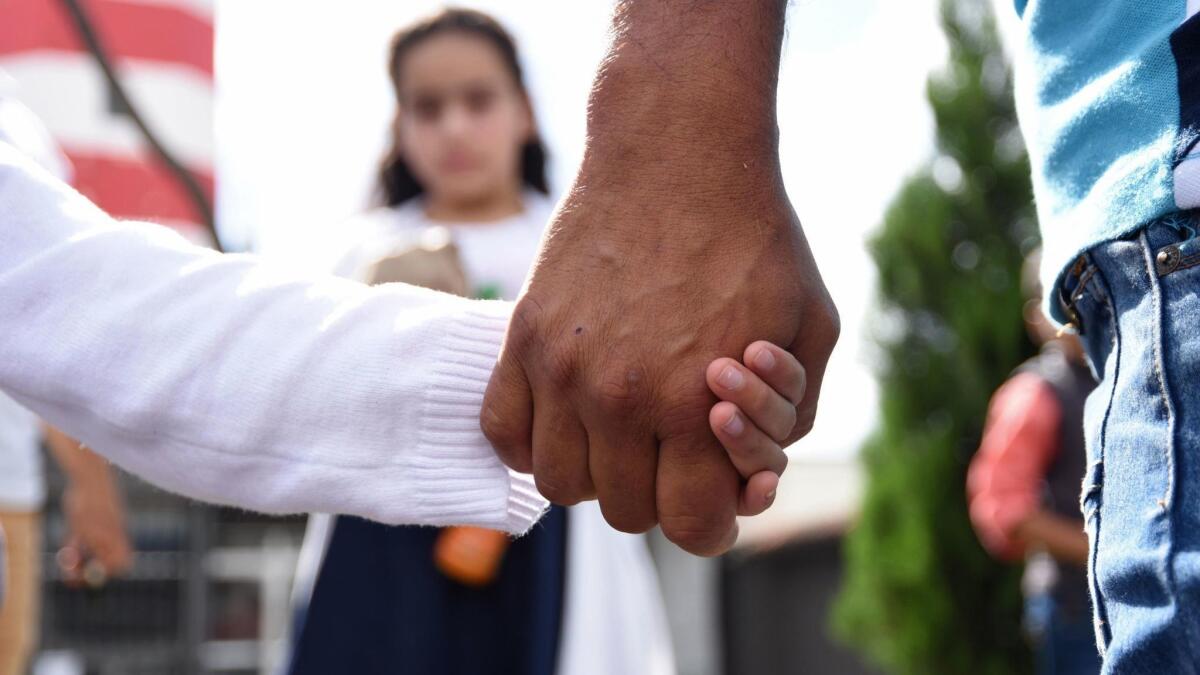San Diego federal judge pleased with government progress to reunite deported parents with children

- Share via
Reporting from SAN DIEGO — A San Diego federal judge on Friday called the new plan to locate and reunite hundreds of deported parents with their separated children “impressive” and gave U.S. officials the green light to move ahead full bore over the weekend.
U.S. District Judge Dana Sabraw also said he was encouraged at the significant strides the government has made in the past week making contact with the deported parents of 299 children, but added that “extreme effort” must be made to track down the remaining parents of 87 children.
The tone of Friday’s hearing was markedly different from one last week in which the judge expressed frustration at the government’s attempt to place the burden of locating all of the deported parents on the American Civil Liberties Union and a host of volunteers. He ordered both sides to come up with a joint plan and seemed pleased with the results presented Friday, saying the proposal showed collaboration.
The focus on deported parents is the second stage of the reunification effort of some 2,500 children ordered by Sabraw. The effort stems from a lawsuit filed by the ACLU challenging the Trump administration’s practice of separating families caught illegally crossing the border or applying for asylum at ports of entry.
Nearly 2,000 children with parents in the U.S. have been reunited, an operation that Sabraw has deemed a success.
A detailed plan by the government on the logistics of reuniting the deported parents with their children, though, suggests much work remains ahead.
Both the government and ACLU have appointed steering committees that will coordinate the efforts and work with government authorities in El Salvador, Guatemala, Honduras and Mexico, where the parents now reside.
A corporate law firm in New York — Paul, Weiss, Rifkind Wharton & Garrison — along with three nonprofits are heading up the ACLU’s outreach mission and will attempt to make contact with each family using information culled from government sources. The families will then be counseled on their legal options so they can determine whether to reunite or to keep their children in the U.S., perhaps with relatives.
The government has proposed giving the ACLU a 14-day deadline for parents to make their decisions, starting at the time the contact information is handed over.
But attorneys with the ACLU and other organizations representing the migrant families in similar lawsuits appeared ready to push back on such a deadline, arguing that the contact information may not be correct and that more investigation is needed.
For families ready to reunify, the government has agreed to provide the children transportation to their countries of origin.
Parents not in the U.S. must still go through the same background checks and confirmation of parentage to be deemed eligible to reunite.
For parents who are more difficult to track down, the government plans to work with the other nations on outreach, including a hotline posted on the embassy websites for parents to call, as well as billboards, ads and notices.
The ACLU also requested that focus return to the first group of children, ages 4 and under, who were initially targeted for reunification under the court order. Of the roughly 100 kids in that group, 57 were reunited by the judge’s July 10 deadline. Others had parents who were deemed ineligible due to serious criminal records or other red flags, while 12 had been deported.
An updated list of the circumstances of those children and contact information for the deported parents is expected next week.
Davis writes for the San Diego Union-Tribune.
More to Read
Sign up for Essential California
The most important California stories and recommendations in your inbox every morning.
You may occasionally receive promotional content from the Los Angeles Times.











